Critical Reflection: A Learning Journal on Social Science Research
VerifiedAdded on 2023/06/14
|6
|1893
|242
Journal and Reflective Writing
AI Summary
This learning journal delves into various aspects of social science research, beginning with the fundamental concepts of ontology and epistemology and their influence on research paradigms. It explores positivist, constructivist, and critical social science research approaches, highlighting their respective ontological positions and suitable research methods. The journal further examines the relationship between theory, methodology, and research design, differentiating between deductionist and inductionist approaches. It outlines the steps involved in both quantitative and qualitative research, emphasizing the importance of literature review, data collection, and analysis. The journal also discusses the specifics of qualitative, quantitative, and mixed-method approaches, providing examples of their applications in different research contexts. It concludes by highlighting the advantages and limitations of each method, emphasizing the role of ontology and epistemology in shaping research design. Desklib offers a wealth of similar resources for students.
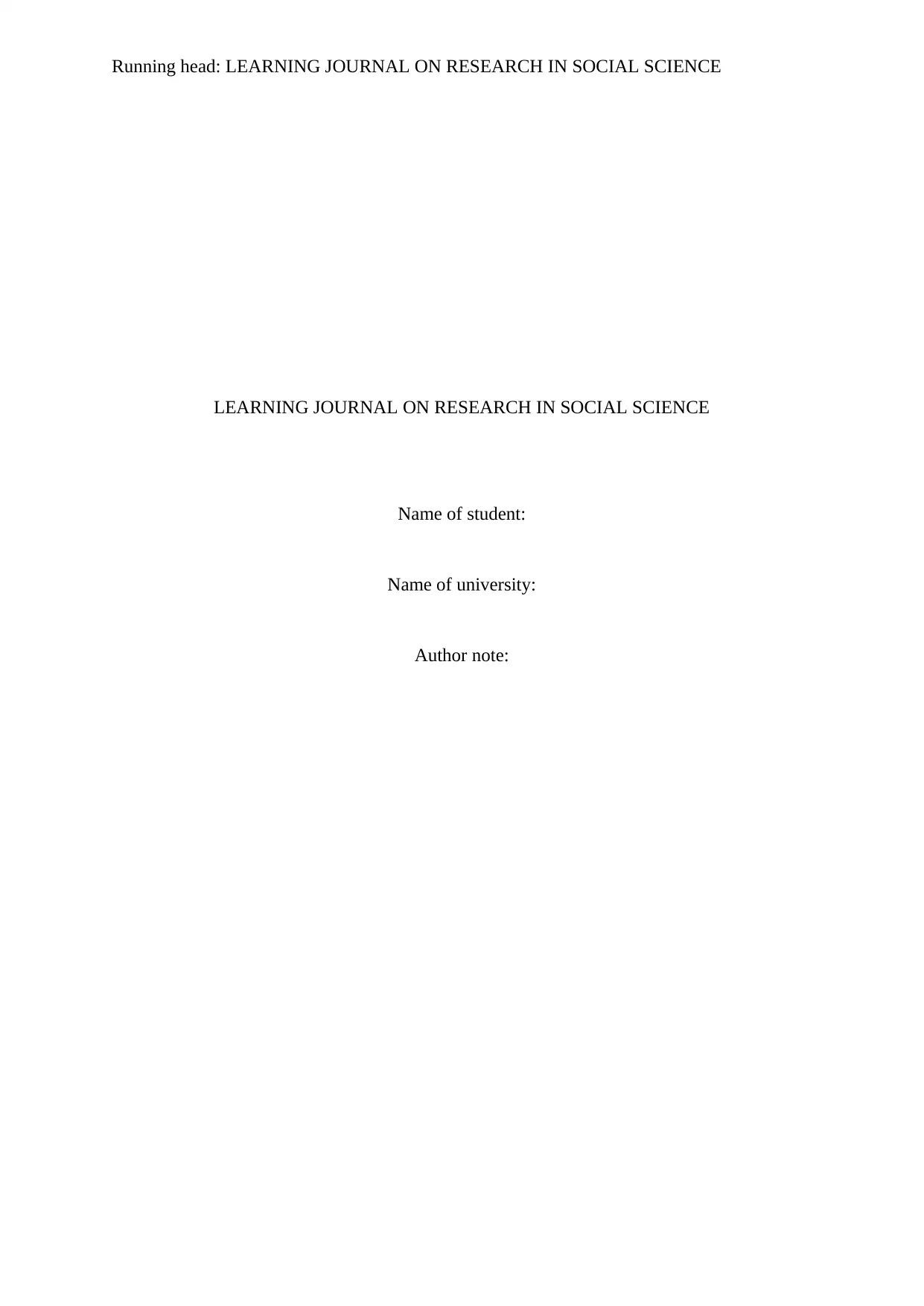
Running head: LEARNING JOURNAL ON RESEARCH IN SOCIAL SCIENCE
LEARNING JOURNAL ON RESEARCH IN SOCIAL SCIENCE
Name of student:
Name of university:
Author note:
LEARNING JOURNAL ON RESEARCH IN SOCIAL SCIENCE
Name of student:
Name of university:
Author note:
Paraphrase This Document
Need a fresh take? Get an instant paraphrase of this document with our AI Paraphraser
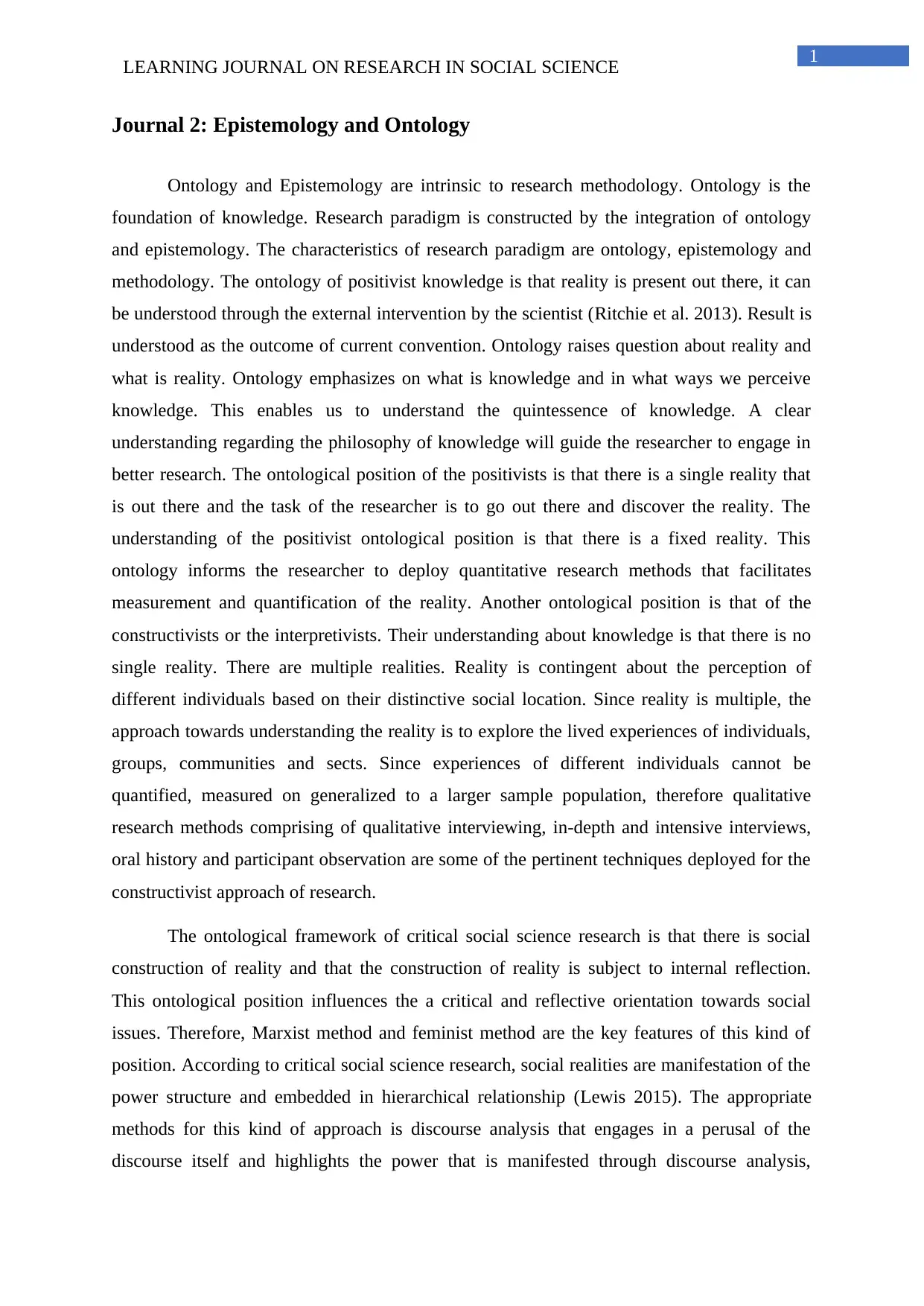
1
LEARNING JOURNAL ON RESEARCH IN SOCIAL SCIENCE
Journal 2: Epistemology and Ontology
Ontology and Epistemology are intrinsic to research methodology. Ontology is the
foundation of knowledge. Research paradigm is constructed by the integration of ontology
and epistemology. The characteristics of research paradigm are ontology, epistemology and
methodology. The ontology of positivist knowledge is that reality is present out there, it can
be understood through the external intervention by the scientist (Ritchie et al. 2013). Result is
understood as the outcome of current convention. Ontology raises question about reality and
what is reality. Ontology emphasizes on what is knowledge and in what ways we perceive
knowledge. This enables us to understand the quintessence of knowledge. A clear
understanding regarding the philosophy of knowledge will guide the researcher to engage in
better research. The ontological position of the positivists is that there is a single reality that
is out there and the task of the researcher is to go out there and discover the reality. The
understanding of the positivist ontological position is that there is a fixed reality. This
ontology informs the researcher to deploy quantitative research methods that facilitates
measurement and quantification of the reality. Another ontological position is that of the
constructivists or the interpretivists. Their understanding about knowledge is that there is no
single reality. There are multiple realities. Reality is contingent about the perception of
different individuals based on their distinctive social location. Since reality is multiple, the
approach towards understanding the reality is to explore the lived experiences of individuals,
groups, communities and sects. Since experiences of different individuals cannot be
quantified, measured on generalized to a larger sample population, therefore qualitative
research methods comprising of qualitative interviewing, in-depth and intensive interviews,
oral history and participant observation are some of the pertinent techniques deployed for the
constructivist approach of research.
The ontological framework of critical social science research is that there is social
construction of reality and that the construction of reality is subject to internal reflection.
This ontological position influences the a critical and reflective orientation towards social
issues. Therefore, Marxist method and feminist method are the key features of this kind of
position. According to critical social science research, social realities are manifestation of the
power structure and embedded in hierarchical relationship (Lewis 2015). The appropriate
methods for this kind of approach is discourse analysis that engages in a perusal of the
discourse itself and highlights the power that is manifested through discourse analysis,
LEARNING JOURNAL ON RESEARCH IN SOCIAL SCIENCE
Journal 2: Epistemology and Ontology
Ontology and Epistemology are intrinsic to research methodology. Ontology is the
foundation of knowledge. Research paradigm is constructed by the integration of ontology
and epistemology. The characteristics of research paradigm are ontology, epistemology and
methodology. The ontology of positivist knowledge is that reality is present out there, it can
be understood through the external intervention by the scientist (Ritchie et al. 2013). Result is
understood as the outcome of current convention. Ontology raises question about reality and
what is reality. Ontology emphasizes on what is knowledge and in what ways we perceive
knowledge. This enables us to understand the quintessence of knowledge. A clear
understanding regarding the philosophy of knowledge will guide the researcher to engage in
better research. The ontological position of the positivists is that there is a single reality that
is out there and the task of the researcher is to go out there and discover the reality. The
understanding of the positivist ontological position is that there is a fixed reality. This
ontology informs the researcher to deploy quantitative research methods that facilitates
measurement and quantification of the reality. Another ontological position is that of the
constructivists or the interpretivists. Their understanding about knowledge is that there is no
single reality. There are multiple realities. Reality is contingent about the perception of
different individuals based on their distinctive social location. Since reality is multiple, the
approach towards understanding the reality is to explore the lived experiences of individuals,
groups, communities and sects. Since experiences of different individuals cannot be
quantified, measured on generalized to a larger sample population, therefore qualitative
research methods comprising of qualitative interviewing, in-depth and intensive interviews,
oral history and participant observation are some of the pertinent techniques deployed for the
constructivist approach of research.
The ontological framework of critical social science research is that there is social
construction of reality and that the construction of reality is subject to internal reflection.
This ontological position influences the a critical and reflective orientation towards social
issues. Therefore, Marxist method and feminist method are the key features of this kind of
position. According to critical social science research, social realities are manifestation of the
power structure and embedded in hierarchical relationship (Lewis 2015). The appropriate
methods for this kind of approach is discourse analysis that engages in a perusal of the
discourse itself and highlights the power that is manifested through discourse analysis,
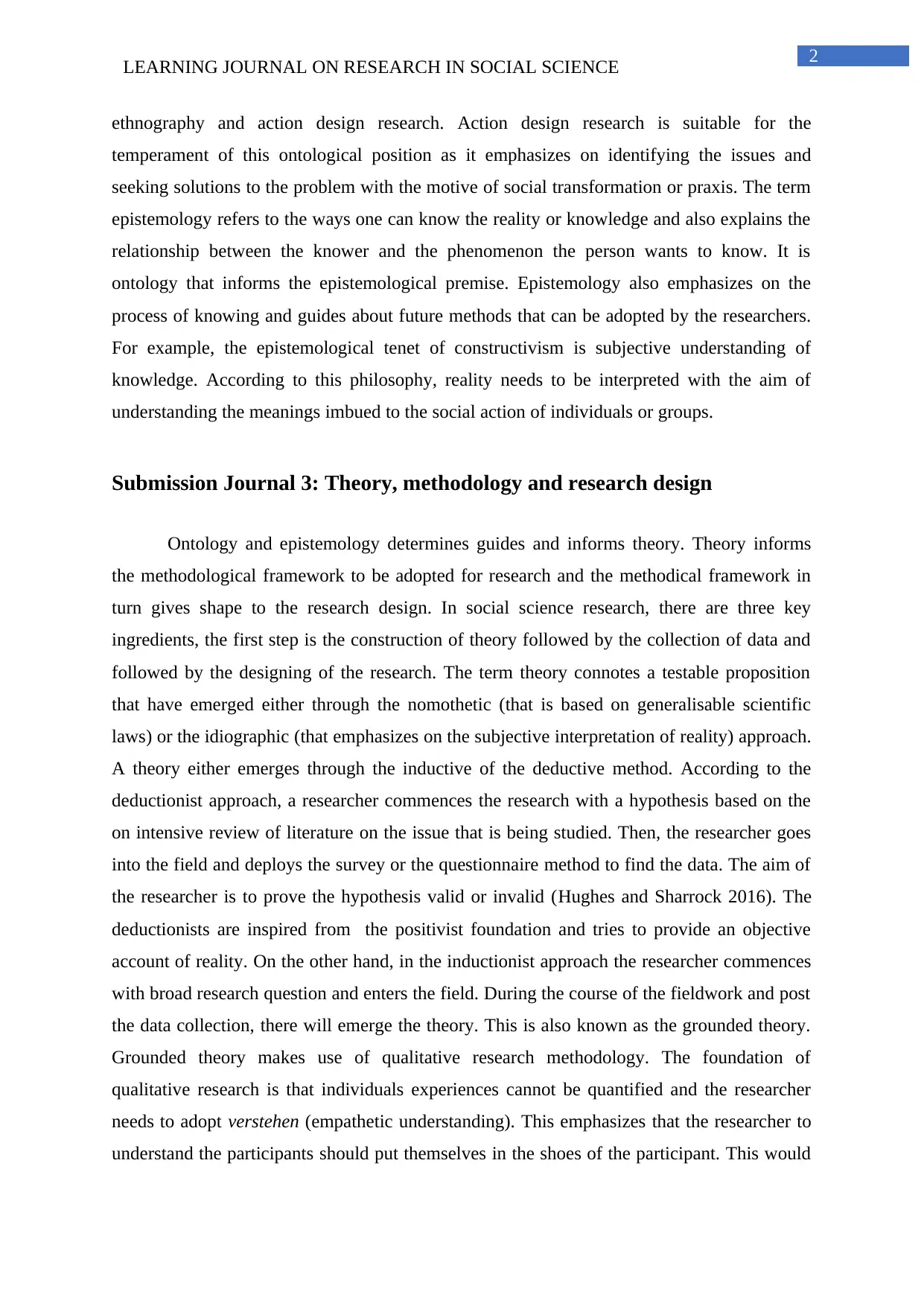
2
LEARNING JOURNAL ON RESEARCH IN SOCIAL SCIENCE
ethnography and action design research. Action design research is suitable for the
temperament of this ontological position as it emphasizes on identifying the issues and
seeking solutions to the problem with the motive of social transformation or praxis. The term
epistemology refers to the ways one can know the reality or knowledge and also explains the
relationship between the knower and the phenomenon the person wants to know. It is
ontology that informs the epistemological premise. Epistemology also emphasizes on the
process of knowing and guides about future methods that can be adopted by the researchers.
For example, the epistemological tenet of constructivism is subjective understanding of
knowledge. According to this philosophy, reality needs to be interpreted with the aim of
understanding the meanings imbued to the social action of individuals or groups.
Submission Journal 3: Theory, methodology and research design
Ontology and epistemology determines guides and informs theory. Theory informs
the methodological framework to be adopted for research and the methodical framework in
turn gives shape to the research design. In social science research, there are three key
ingredients, the first step is the construction of theory followed by the collection of data and
followed by the designing of the research. The term theory connotes a testable proposition
that have emerged either through the nomothetic (that is based on generalisable scientific
laws) or the idiographic (that emphasizes on the subjective interpretation of reality) approach.
A theory either emerges through the inductive of the deductive method. According to the
deductionist approach, a researcher commences the research with a hypothesis based on the
on intensive review of literature on the issue that is being studied. Then, the researcher goes
into the field and deploys the survey or the questionnaire method to find the data. The aim of
the researcher is to prove the hypothesis valid or invalid (Hughes and Sharrock 2016). The
deductionists are inspired from the positivist foundation and tries to provide an objective
account of reality. On the other hand, in the inductionist approach the researcher commences
with broad research question and enters the field. During the course of the fieldwork and post
the data collection, there will emerge the theory. This is also known as the grounded theory.
Grounded theory makes use of qualitative research methodology. The foundation of
qualitative research is that individuals experiences cannot be quantified and the researcher
needs to adopt verstehen (empathetic understanding). This emphasizes that the researcher to
understand the participants should put themselves in the shoes of the participant. This would
LEARNING JOURNAL ON RESEARCH IN SOCIAL SCIENCE
ethnography and action design research. Action design research is suitable for the
temperament of this ontological position as it emphasizes on identifying the issues and
seeking solutions to the problem with the motive of social transformation or praxis. The term
epistemology refers to the ways one can know the reality or knowledge and also explains the
relationship between the knower and the phenomenon the person wants to know. It is
ontology that informs the epistemological premise. Epistemology also emphasizes on the
process of knowing and guides about future methods that can be adopted by the researchers.
For example, the epistemological tenet of constructivism is subjective understanding of
knowledge. According to this philosophy, reality needs to be interpreted with the aim of
understanding the meanings imbued to the social action of individuals or groups.
Submission Journal 3: Theory, methodology and research design
Ontology and epistemology determines guides and informs theory. Theory informs
the methodological framework to be adopted for research and the methodical framework in
turn gives shape to the research design. In social science research, there are three key
ingredients, the first step is the construction of theory followed by the collection of data and
followed by the designing of the research. The term theory connotes a testable proposition
that have emerged either through the nomothetic (that is based on generalisable scientific
laws) or the idiographic (that emphasizes on the subjective interpretation of reality) approach.
A theory either emerges through the inductive of the deductive method. According to the
deductionist approach, a researcher commences the research with a hypothesis based on the
on intensive review of literature on the issue that is being studied. Then, the researcher goes
into the field and deploys the survey or the questionnaire method to find the data. The aim of
the researcher is to prove the hypothesis valid or invalid (Hughes and Sharrock 2016). The
deductionists are inspired from the positivist foundation and tries to provide an objective
account of reality. On the other hand, in the inductionist approach the researcher commences
with broad research question and enters the field. During the course of the fieldwork and post
the data collection, there will emerge the theory. This is also known as the grounded theory.
Grounded theory makes use of qualitative research methodology. The foundation of
qualitative research is that individuals experiences cannot be quantified and the researcher
needs to adopt verstehen (empathetic understanding). This emphasizes that the researcher to
understand the participants should put themselves in the shoes of the participant. This would
⊘ This is a preview!⊘
Do you want full access?
Subscribe today to unlock all pages.

Trusted by 1+ million students worldwide
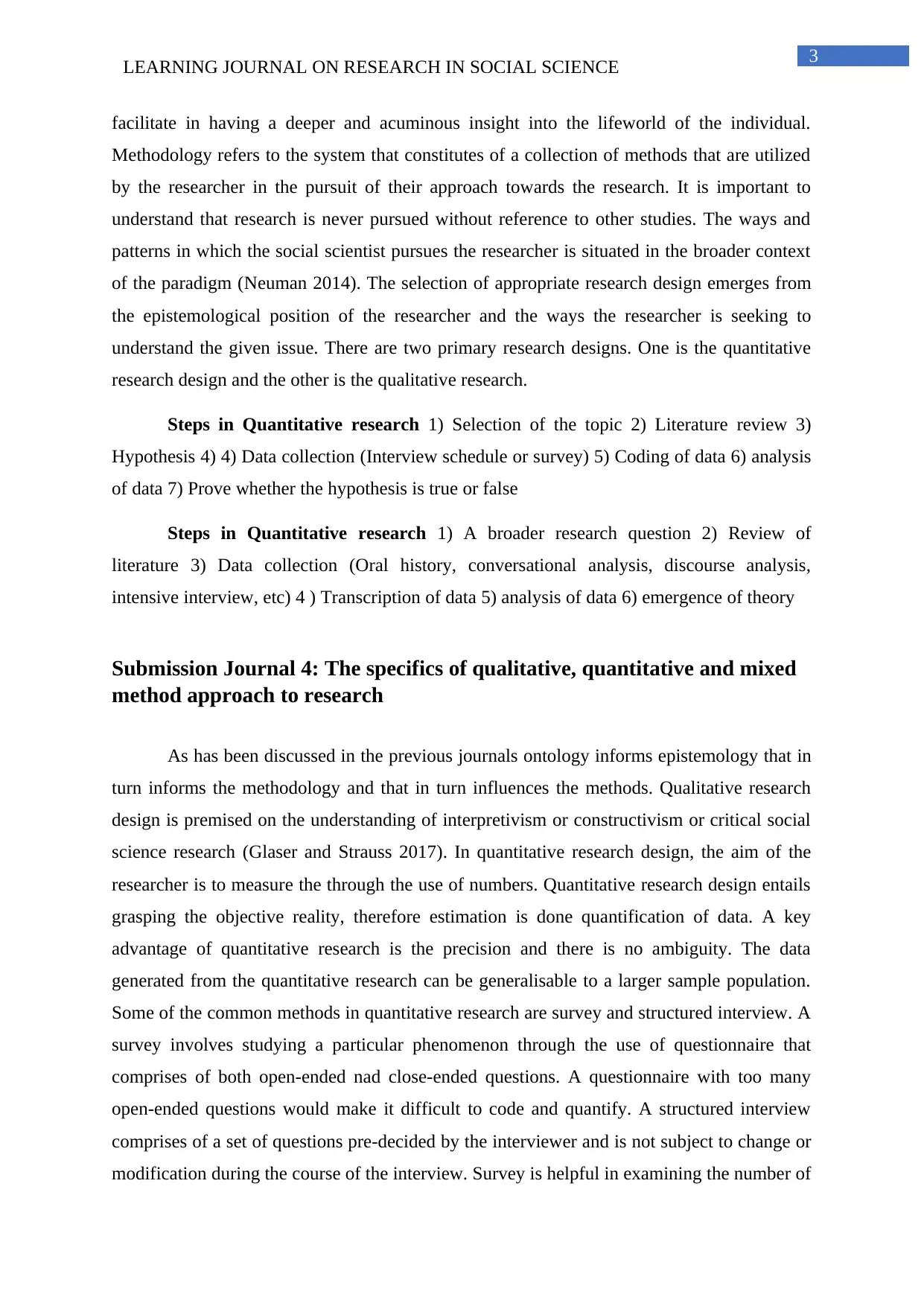
3
LEARNING JOURNAL ON RESEARCH IN SOCIAL SCIENCE
facilitate in having a deeper and acuminous insight into the lifeworld of the individual.
Methodology refers to the system that constitutes of a collection of methods that are utilized
by the researcher in the pursuit of their approach towards the research. It is important to
understand that research is never pursued without reference to other studies. The ways and
patterns in which the social scientist pursues the researcher is situated in the broader context
of the paradigm (Neuman 2014). The selection of appropriate research design emerges from
the epistemological position of the researcher and the ways the researcher is seeking to
understand the given issue. There are two primary research designs. One is the quantitative
research design and the other is the qualitative research.
Steps in Quantitative research 1) Selection of the topic 2) Literature review 3)
Hypothesis 4) 4) Data collection (Interview schedule or survey) 5) Coding of data 6) analysis
of data 7) Prove whether the hypothesis is true or false
Steps in Quantitative research 1) A broader research question 2) Review of
literature 3) Data collection (Oral history, conversational analysis, discourse analysis,
intensive interview, etc) 4 ) Transcription of data 5) analysis of data 6) emergence of theory
Submission Journal 4: The specifics of qualitative, quantitative and mixed
method approach to research
As has been discussed in the previous journals ontology informs epistemology that in
turn informs the methodology and that in turn influences the methods. Qualitative research
design is premised on the understanding of interpretivism or constructivism or critical social
science research (Glaser and Strauss 2017). In quantitative research design, the aim of the
researcher is to measure the through the use of numbers. Quantitative research design entails
grasping the objective reality, therefore estimation is done quantification of data. A key
advantage of quantitative research is the precision and there is no ambiguity. The data
generated from the quantitative research can be generalisable to a larger sample population.
Some of the common methods in quantitative research are survey and structured interview. A
survey involves studying a particular phenomenon through the use of questionnaire that
comprises of both open-ended nad close-ended questions. A questionnaire with too many
open-ended questions would make it difficult to code and quantify. A structured interview
comprises of a set of questions pre-decided by the interviewer and is not subject to change or
modification during the course of the interview. Survey is helpful in examining the number of
LEARNING JOURNAL ON RESEARCH IN SOCIAL SCIENCE
facilitate in having a deeper and acuminous insight into the lifeworld of the individual.
Methodology refers to the system that constitutes of a collection of methods that are utilized
by the researcher in the pursuit of their approach towards the research. It is important to
understand that research is never pursued without reference to other studies. The ways and
patterns in which the social scientist pursues the researcher is situated in the broader context
of the paradigm (Neuman 2014). The selection of appropriate research design emerges from
the epistemological position of the researcher and the ways the researcher is seeking to
understand the given issue. There are two primary research designs. One is the quantitative
research design and the other is the qualitative research.
Steps in Quantitative research 1) Selection of the topic 2) Literature review 3)
Hypothesis 4) 4) Data collection (Interview schedule or survey) 5) Coding of data 6) analysis
of data 7) Prove whether the hypothesis is true or false
Steps in Quantitative research 1) A broader research question 2) Review of
literature 3) Data collection (Oral history, conversational analysis, discourse analysis,
intensive interview, etc) 4 ) Transcription of data 5) analysis of data 6) emergence of theory
Submission Journal 4: The specifics of qualitative, quantitative and mixed
method approach to research
As has been discussed in the previous journals ontology informs epistemology that in
turn informs the methodology and that in turn influences the methods. Qualitative research
design is premised on the understanding of interpretivism or constructivism or critical social
science research (Glaser and Strauss 2017). In quantitative research design, the aim of the
researcher is to measure the through the use of numbers. Quantitative research design entails
grasping the objective reality, therefore estimation is done quantification of data. A key
advantage of quantitative research is the precision and there is no ambiguity. The data
generated from the quantitative research can be generalisable to a larger sample population.
Some of the common methods in quantitative research are survey and structured interview. A
survey involves studying a particular phenomenon through the use of questionnaire that
comprises of both open-ended nad close-ended questions. A questionnaire with too many
open-ended questions would make it difficult to code and quantify. A structured interview
comprises of a set of questions pre-decided by the interviewer and is not subject to change or
modification during the course of the interview. Survey is helpful in examining the number of
Paraphrase This Document
Need a fresh take? Get an instant paraphrase of this document with our AI Paraphraser
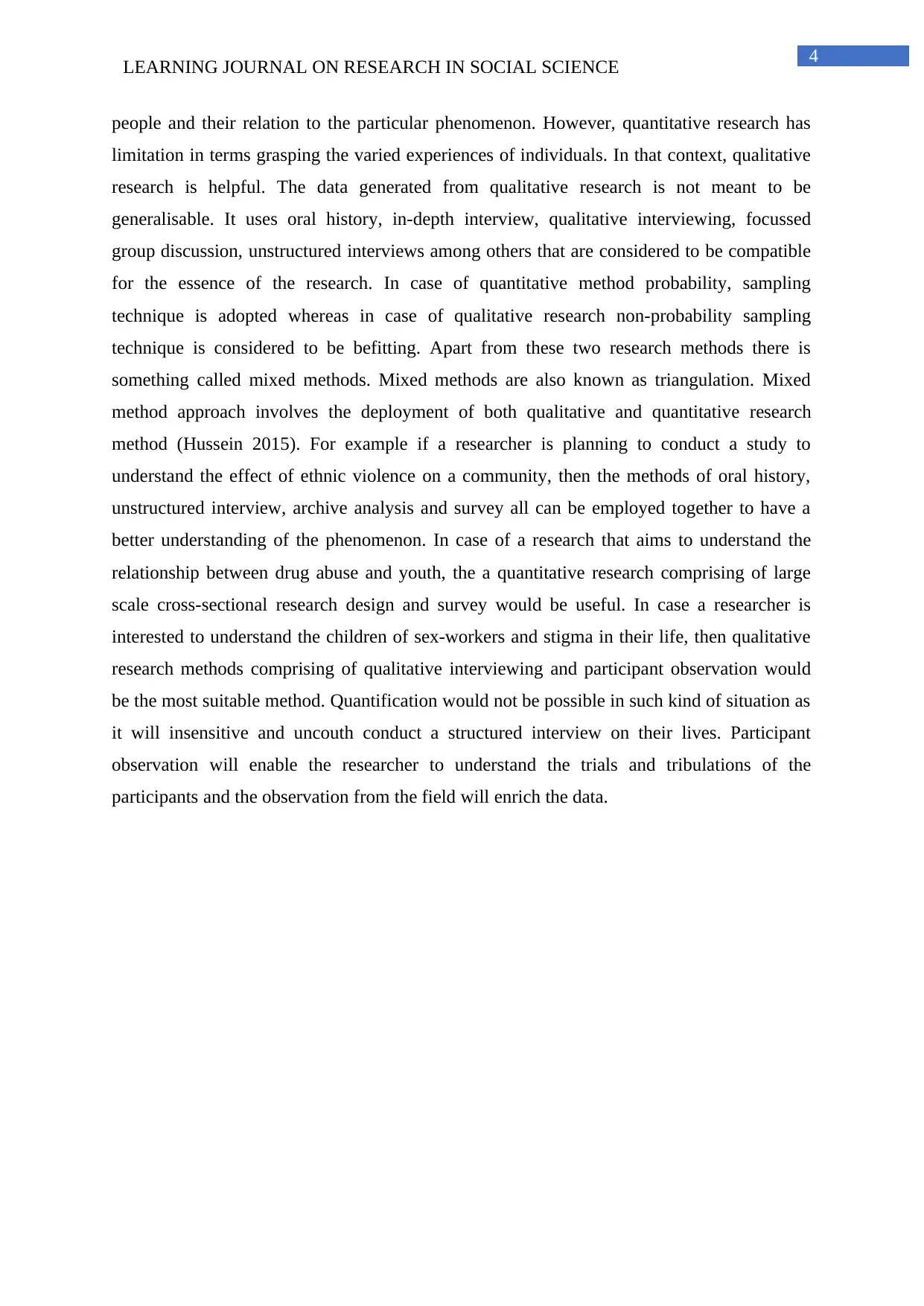
4
LEARNING JOURNAL ON RESEARCH IN SOCIAL SCIENCE
people and their relation to the particular phenomenon. However, quantitative research has
limitation in terms grasping the varied experiences of individuals. In that context, qualitative
research is helpful. The data generated from qualitative research is not meant to be
generalisable. It uses oral history, in-depth interview, qualitative interviewing, focussed
group discussion, unstructured interviews among others that are considered to be compatible
for the essence of the research. In case of quantitative method probability, sampling
technique is adopted whereas in case of qualitative research non-probability sampling
technique is considered to be befitting. Apart from these two research methods there is
something called mixed methods. Mixed methods are also known as triangulation. Mixed
method approach involves the deployment of both qualitative and quantitative research
method (Hussein 2015). For example if a researcher is planning to conduct a study to
understand the effect of ethnic violence on a community, then the methods of oral history,
unstructured interview, archive analysis and survey all can be employed together to have a
better understanding of the phenomenon. In case of a research that aims to understand the
relationship between drug abuse and youth, the a quantitative research comprising of large
scale cross-sectional research design and survey would be useful. In case a researcher is
interested to understand the children of sex-workers and stigma in their life, then qualitative
research methods comprising of qualitative interviewing and participant observation would
be the most suitable method. Quantification would not be possible in such kind of situation as
it will insensitive and uncouth conduct a structured interview on their lives. Participant
observation will enable the researcher to understand the trials and tribulations of the
participants and the observation from the field will enrich the data.
LEARNING JOURNAL ON RESEARCH IN SOCIAL SCIENCE
people and their relation to the particular phenomenon. However, quantitative research has
limitation in terms grasping the varied experiences of individuals. In that context, qualitative
research is helpful. The data generated from qualitative research is not meant to be
generalisable. It uses oral history, in-depth interview, qualitative interviewing, focussed
group discussion, unstructured interviews among others that are considered to be compatible
for the essence of the research. In case of quantitative method probability, sampling
technique is adopted whereas in case of qualitative research non-probability sampling
technique is considered to be befitting. Apart from these two research methods there is
something called mixed methods. Mixed methods are also known as triangulation. Mixed
method approach involves the deployment of both qualitative and quantitative research
method (Hussein 2015). For example if a researcher is planning to conduct a study to
understand the effect of ethnic violence on a community, then the methods of oral history,
unstructured interview, archive analysis and survey all can be employed together to have a
better understanding of the phenomenon. In case of a research that aims to understand the
relationship between drug abuse and youth, the a quantitative research comprising of large
scale cross-sectional research design and survey would be useful. In case a researcher is
interested to understand the children of sex-workers and stigma in their life, then qualitative
research methods comprising of qualitative interviewing and participant observation would
be the most suitable method. Quantification would not be possible in such kind of situation as
it will insensitive and uncouth conduct a structured interview on their lives. Participant
observation will enable the researcher to understand the trials and tribulations of the
participants and the observation from the field will enrich the data.
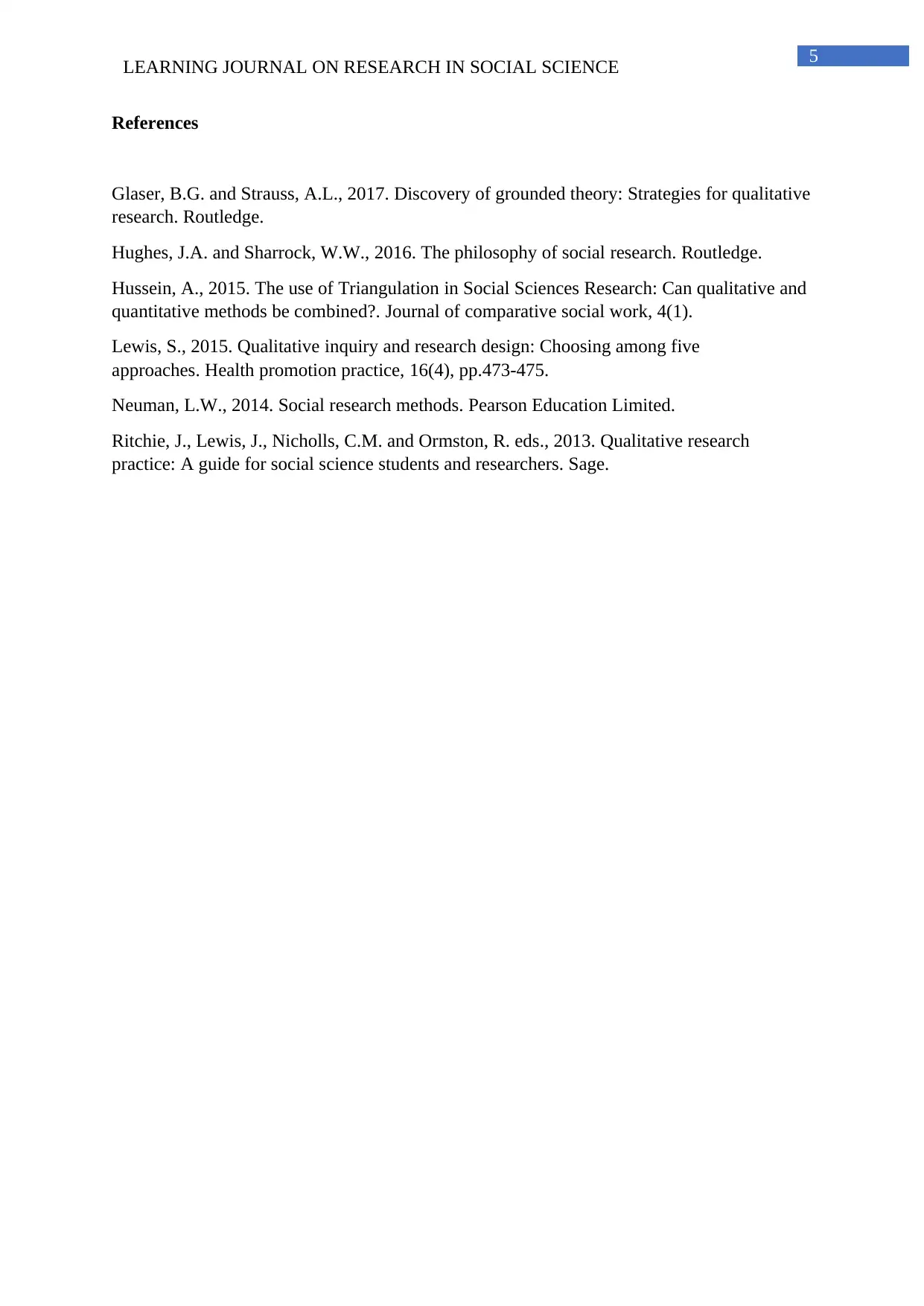
5
LEARNING JOURNAL ON RESEARCH IN SOCIAL SCIENCE
References
Glaser, B.G. and Strauss, A.L., 2017. Discovery of grounded theory: Strategies for qualitative
research. Routledge.
Hughes, J.A. and Sharrock, W.W., 2016. The philosophy of social research. Routledge.
Hussein, A., 2015. The use of Triangulation in Social Sciences Research: Can qualitative and
quantitative methods be combined?. Journal of comparative social work, 4(1).
Lewis, S., 2015. Qualitative inquiry and research design: Choosing among five
approaches. Health promotion practice, 16(4), pp.473-475.
Neuman, L.W., 2014. Social research methods. Pearson Education Limited.
Ritchie, J., Lewis, J., Nicholls, C.M. and Ormston, R. eds., 2013. Qualitative research
practice: A guide for social science students and researchers. Sage.
LEARNING JOURNAL ON RESEARCH IN SOCIAL SCIENCE
References
Glaser, B.G. and Strauss, A.L., 2017. Discovery of grounded theory: Strategies for qualitative
research. Routledge.
Hughes, J.A. and Sharrock, W.W., 2016. The philosophy of social research. Routledge.
Hussein, A., 2015. The use of Triangulation in Social Sciences Research: Can qualitative and
quantitative methods be combined?. Journal of comparative social work, 4(1).
Lewis, S., 2015. Qualitative inquiry and research design: Choosing among five
approaches. Health promotion practice, 16(4), pp.473-475.
Neuman, L.W., 2014. Social research methods. Pearson Education Limited.
Ritchie, J., Lewis, J., Nicholls, C.M. and Ormston, R. eds., 2013. Qualitative research
practice: A guide for social science students and researchers. Sage.
⊘ This is a preview!⊘
Do you want full access?
Subscribe today to unlock all pages.

Trusted by 1+ million students worldwide
1 out of 6
Related Documents
Your All-in-One AI-Powered Toolkit for Academic Success.
+13062052269
info@desklib.com
Available 24*7 on WhatsApp / Email
![[object Object]](/_next/static/media/star-bottom.7253800d.svg)
Unlock your academic potential
Copyright © 2020–2026 A2Z Services. All Rights Reserved. Developed and managed by ZUCOL.





